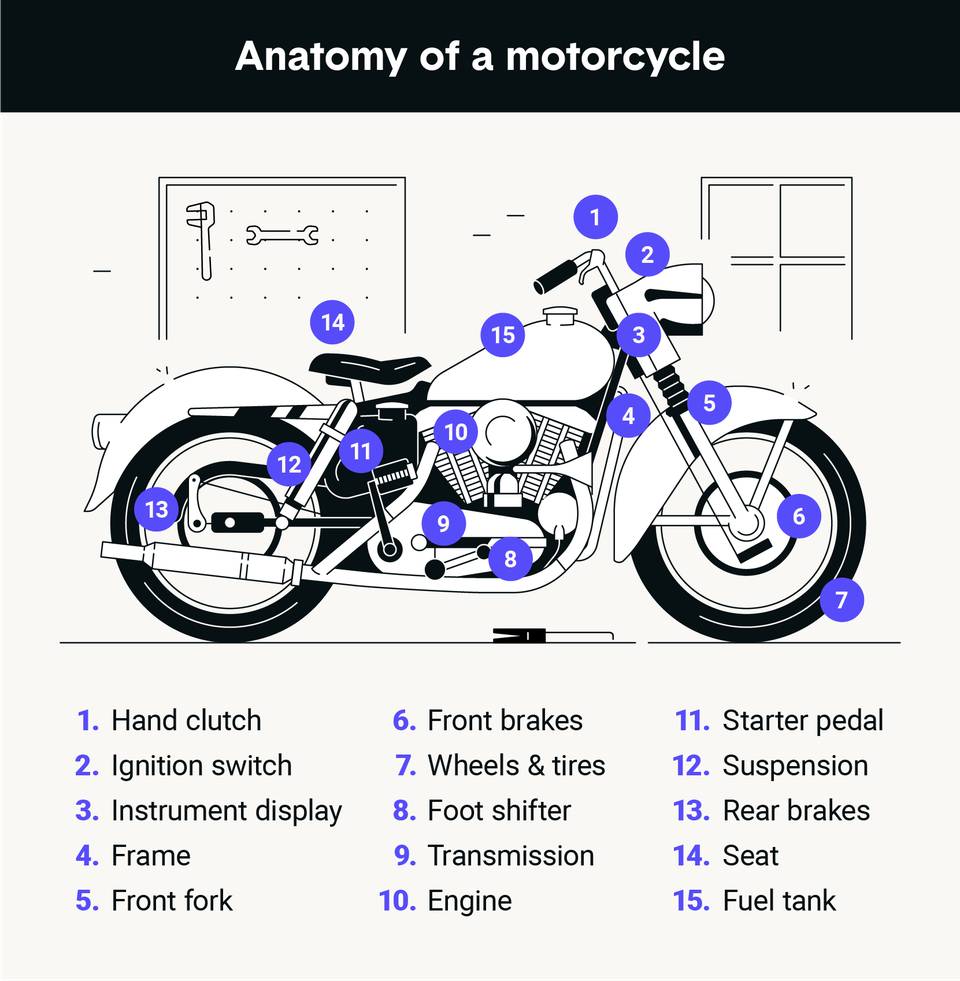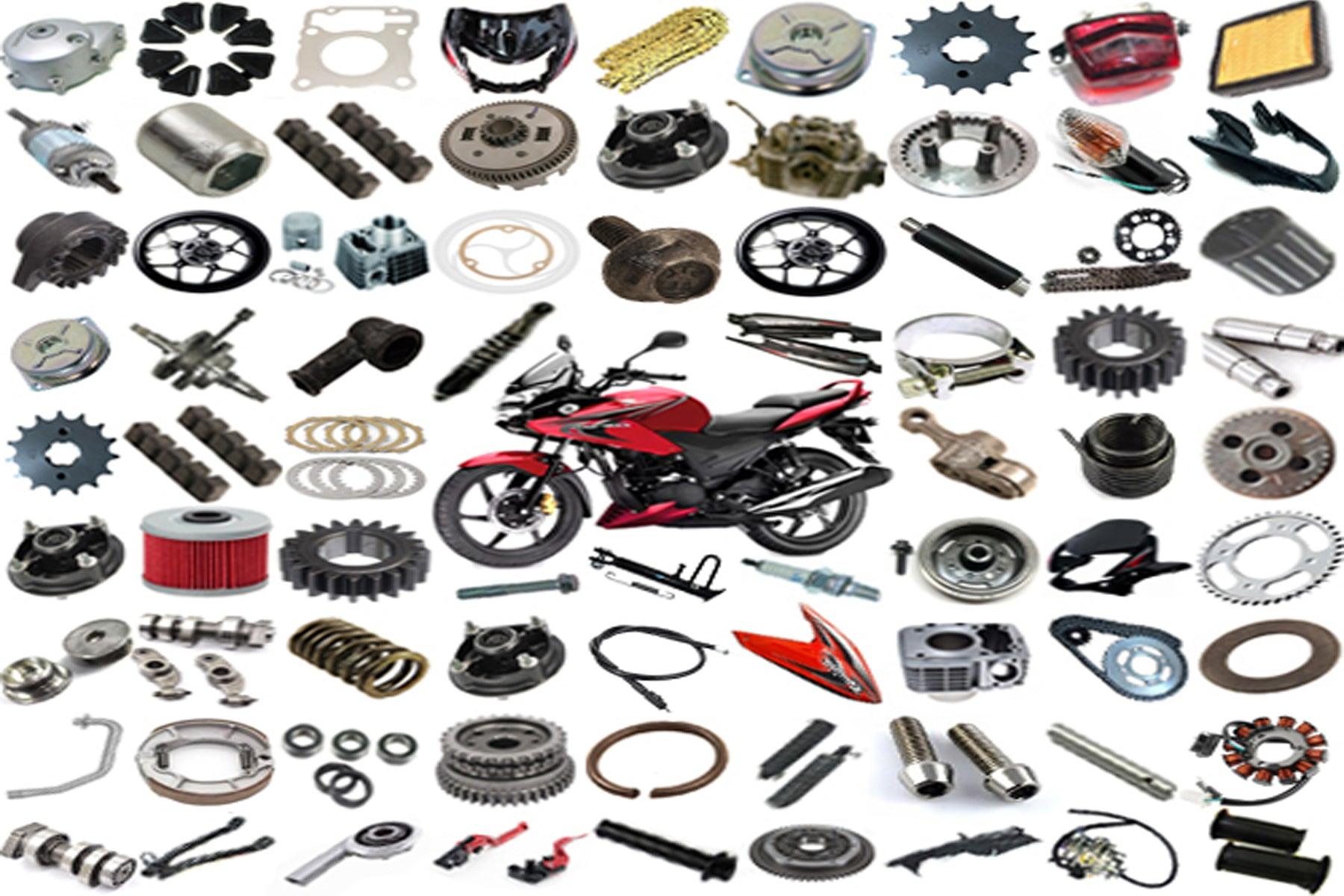Everything You Need to Know Into Performance Tuning with Bike Parts Wellington
Everything You Need to Know Into Performance Tuning with Bike Parts Wellington
Blog Article
Discover the Vital Motorcycle Parts You Required for Optimal Efficiency
Recognizing the important parts of a motorbike is essential for attaining peak performance. Each component, from the engine to the stopping system, plays a crucial role in overall functionality and safety and security. Normal maintenance can avoid unanticipated failures and boost the riding experience. Nevertheless, several riders ignore the ins and outs of these systems. Uncovering just how they interact can result in a more reliable adventure. What critical elements should every rider focus on?
The Engine: The Heart of Your Bike
The engine serves as the core element of a motorcycle, driving its performance and specifying its abilities. It is liable for transforming fuel into mechanical power, which powers the bike forward. Various kinds of engines are employed, consisting of single-cylinder, V-twin, and inline arrangements, each offering distinctive qualities matched for various riding designs and objectives. The engine dimension, normally determined in cubic centimeters (cc), substantially affects performance, with larger engines generally giving more power and torque.Furthermore, the engine's style and modern technology, such as gas injection systems or air-cooling versus liquid-cooling, influence effectiveness and dependability. Upkeep is crucial for peak operation; factors like regular oil changes and monitoring ignition system guarantee long life. Motorcyclists commonly take into consideration an engine's responsiveness and smoothness, as these attributes boost the total riding experience. Eventually, the engine remains a critical component that specifies not only the bike's efficiency however likewise the cyclist's connection to the device.
The Transmission: Changing Gears Smoothly
The transmission plays a crucial duty in a motorbike's efficiency, specifically in the technicians of gear changing. Understanding exactly how to shift equipments efficiently can boost the total riding experience, while regular upkeep assurances peak performance. Correct focus to these facets can substantially influence the long life and efficiency of the motorbike.

Equipment Shifting Mechanics
Smooth gear changing is vital for excellent motorbike performance, significantly influencing both velocity and control. The auto mechanics of gear shifting include the interaction between the clutch, gear bar, and transmission system. When a motorcyclist involves the clutch, it disengages the engine from the transmission, allowing for an equipment adjustment without damaging the parts. A well-timed release of the clutch, incorporated with specific movement of the equipment bar, facilitates a seamless change in between equipments. This procedure guarantees that the engine runs within its finest power band, improving performance. Oem Parts New Zealand. Additionally, recognizing the gear ratios and their impact on rate and torque can help cyclists make informed choices during changes, inevitably contributing to a more receptive and pleasurable riding experience
Upkeep Tips Significance
Routine maintenance plays a crucial function in guaranteeing that the transmission system operates efficiently, enabling smooth equipment changes. Regularly changing the transmission and checking liquid is vital, as old fluid can lead to enhanced friction and wear. Furthermore, examining the clutch for wear guarantees peak interaction and disengagement, protecting against slippage throughout equipment adjustments. Lubrication of moving parts is equally crucial to reduce friction and improve performance. Bike proprietors need to additionally check for leakages and uncommon noises, as these can indicate underlying concerns. By adhering to these maintenance suggestions, riders can lengthen the lifespan of their transmission system, assuring that gear shifts stay seamless and adding to the general performance of their motorbike.
The Braking System: Ensuring Safety on Every Ride
Braking systems are essential elements that directly affect a motorbike's safety and security and efficiency. They include various components, including brake pads, blades, calipers, and hydraulic lines, all collaborating to ensure effective slowdown. The kind of braking system-- generally either disc or drum-- affects responsiveness and quiting power.Regular maintenance is necessary to copyright peak efficiency; worn brake pads can result in lowered efficiency and increased stopping ranges. Additionally, the quality of brake fluid should be checked, as it can absorb dampness with time, compromising stopping efficiency.Riders should additionally think about the importance of anti-lock braking systems (ABDOMINAL MUSCLE), which protect against wheel lockup throughout sudden quits, enhancing general safety. Correctly operating brakes are not almost stopping; they impart confidence in the biker, enabling safer navigating via various surfaces. Ultimately, a trusted braking system is important for taking pleasure in every ride with assurance.
The Suspension: Enhancing Convenience and Control
A well-functioning shock absorber substantially adds to a motorcycle's overall efficiency, matching the performance of the stopping system. The suspension plays a considerable function in absorbing shocks from unequal surfaces, assuring a smoother adventure while preserving tire contact with the road. This call is crucial for both stability and control, allowing motorcyclists to navigate corners with self-confidence and precision.Different types of suspension systems, such as telescopic forks or mono-shocks, offer differing levels of comfort and handling. Effectively tuned suspension boosts responsiveness, providing the biker with a more linked feeling to the motorbike. Regular maintenance checks are crucial to identify the suspension parts, consisting of dampers and springtimes, are operating at their ideal. An efficient shock absorber not only elevates the riding experience yet likewise adds to the durability of other motorcycle parts by reducing wear and tear. Consequently, buying quality suspension is essential for any type of serious motorcycle fanatic.
The Tires: Linking You to the Road
Tires play an essential duty in a motorcycle's efficiency, acting as the primary link in between the biker and the road. Comprehending the different kinds of tires offered can greatly affect dealing with and safety. Furthermore, regular upkeep is vital to ensure peak tire efficiency and longevity.
Tire Types Explained
Exactly how do various tire types affect a motorcycle's performance? Tire types play an important duty in determining a motorbike's hold, security, and handling. Sporting activity tires, designed for high efficiency, deal enhanced traction and responsiveness on smooth roadways, making them optimal for competing and hostile riding. On the other hand, exploring tires prioritize durability and convenience, supplying a smoother trip for long-distance traveling. Off-road tires, identified by their rugged walk patterns, master grip on unpaved surfaces, ideal for journey lovers. Furthermore, dual-sport tires blend features from both off-road and on-road categories, accommodating versatile riding demands. Inevitably, selecting the best tire kind is vital for optimizing performance, making sure safety and security, and boosting the general riding experience.
Upkeep Tips Offered
While riding when traveling, keeping excellent tire condition is vital official site for safety and performance. Routinely inspecting tire stress is very important, as under-inflated tires can bring about bad handling and raised wear. It is suggested to check walk deepness often; worn tires compromise grasp and stability. In addition, cyclists need to try to find indications of damage, such as lumps or splits, which can indicate the need for substitute. Turning tires periodically guarantees also put on, enhancing durability. Keeping tires tidy from particles and preventing extreme curbs can extend their life expectancy. Finally, keeping appropriate positioning and balance contributes to come to a head performance, minimizing stress and anxiety on various other bike elements. Complying with these upkeep tips will substantially improve the total riding experience.
The Fuel System: Sustaining Performance and Efficiency
The gas system plays a vital function in making best use of a motorbike's efficiency and effectiveness, as it assures the optimal delivery of gas to the engine. It consists of several important elements, consisting of the fuel tank, gas pump, fuel filter, and gas injectors or carburetor. Each component must operate effectively to ensure a effective and smooth ride.The gas container shops fuel and provides it to the engine by means of the fuel pump, which generates the needed stress. A gas filter protects against contaminants from going into the engine, while the injectors or carburetor mix fuel with air for combustion.Proper upkeep of the fuel system is important; a clogged up filter or malfunctioning injector can lead to lowered performance and boosted fuel consumption. By verifying that the fuel system operates effectively, cyclists can delight in improved throttle reaction, better fuel economy, and in general improved riding experience.
The Electric System: Powering Your Adventure
A reliable electric system is necessary for the total functionality and safety and security of a motorcycle, as it powers important parts such as the ignition, illumination, and various electronic systems. This system includes the battery, which stores energy, and the generator, accountable for creating power while the engine runs. The electrical wiring harness attaches these components, ensuring reputable power distribution.Additionally, fuses secure the system from overloads, while relays assist control high-current devices with low-power signals. A properly maintained electric system enhances efficiency by making sure smooth beginnings and regular operation of lights and signals, crucial for cyclist visibility and safety.Regular checks of the battery's charge and links are very important for avoiding electric failings. Motorcyclists ought to also inspect electrical wiring for damage, ensuring all components function ideally. Ultimately, a robust electrical system adds considerably to the overall efficiency and dependability of the motorbike.
Frequently Asked Inquiries
How Frequently Should I Replace My Bike's Battery?
The regularity of bike battery substitute relies on usage and maintenance (Motorcycle Spares Christchurch). Typically, batteries must be changed every 3 to 5 years. Routine checks can assist determine when a replacement is required for peak performance
What Tools Do I Required for Basic Motorcycle Maintenance?
For basic motorcycle upkeep, one calls for vital tools such as an outlet set, wrenches, screwdrivers, pliers, tire pressure gauge, and a torque wrench. These tools facilitate efficient upkeep and guarantee the motorcycle runs efficiently and safely.
Exactly How Can I Boost My Bike's The rules of aerodynamics?
To boost motorcycle aerodynamics, one should consider readjusting fairings, using windscreen extensions, optimizing body setting, and lowering overall weight. These modifications aid reduce drag, improving stability and fuel efficiency during experiences.
What Are the Indications of a Failing Electric System?
Signs of a failing electrical system include lowering lights, trouble beginning, uneven tool readings, and blown merges. Bike Parts Wellington. Unusual smells or rust around battery terminals may also indicate underlying concerns requiring prompt interest for security and performance

Exactly how Do I Select the Right Oil for My Motorbike?
When choosing oil for a motorbike, one need to take into consideration the supplier's requirements, viscosity scores, and the type of riding. Furthermore, synthetic versus conventional oil can impact efficiency and engine defense, affecting the decision considerably. The engine size, commonly measured in cubic centimeters (cc), substantially affects performance, with larger engines typically providing even more power and torque.Furthermore, the engine's style and modern technology, such as fuel injection systems or air-cooling versus liquid-cooling, impact efficiency and integrity. A well-functioning suspension system substantially adds to a motorbike's overall performance, enhancing the efficiency of the braking system. The gas system plays a vital duty in taking full advantage of a motorbike's efficiency and effectiveness, as it ensures the ideal shipment of gas to the engine. A gas filter prevents impurities from going into the engine, while the injectors or carburetor mix fuel with air for combustion.Proper upkeep of the gas system is vital; a stopped up filter or malfunctioning injector can great site lead to decreased efficiency pop over here and increased gas intake. A properly maintained electrical system improves performance by ensuring smooth beginnings and consistent procedure of lights and signals, essential for biker presence and safety.Regular checks of the battery's charge and connections are important for protecting against electric failures.
Report this page